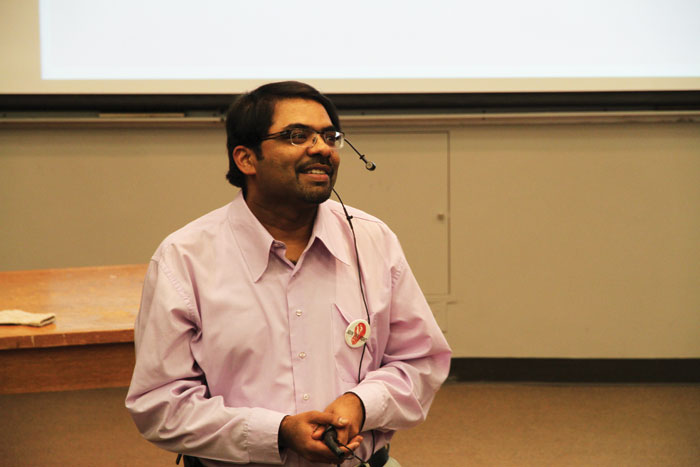In an effort to raise awareness about the impact Ebolavirus disease (EVD) has had on thousands, McGill Students Fight Ebola hosted a conference last Wednesday, Feb. 18, featuring a panel of Ebola experts. The aim was to inform those interested in the problems and perspectives of non-governmental organizations (NGOs) during the latest EVD epidemic, and fundraise for the fight against Ebola.
Dr. Gary Gottlieb, President and CEO of Partners in Health—a healthcare organization combatting Ebola—operates on the belief that health care is a human right.
“The function of Partners In Health is one that has evolved to be focused on health systems strengthening in developing countries,” Gottlieb explained.
Partners in Health focuses on forming strong connections with the local community by preserving a local healthcare system. Some of its services include care for HIV, drug-resistant tuberculosis, and EVD.
However, Partners in Health does not have much in the way of disaster response.
“Ebola was seen as an opportunity to accompany governments and to assist them by establishing ourselves in Liberia and Sierra Leone, and providing ongoing, sustainable health care,” Gottlieb said.
He also explained that Partners in Health can only operate in countries when invited by the local government, making operations in countries with absent or unstable leadership incredibly difficult.
Providing a global perspective on the impact of this epidemic was Médecins Sans Frontières (MSF) Canada President, Dr. Heather Culbert.
Throughout the 20th century, because MSF has responded to numerous EVD outbreaks, it has been able to optimize its services to patients.
“[MSF] is one of the few agencies that has a treatment protocol for Ebola,” Culbert said. “This includes contact tracing, containment, and education in the community.”
A combination of factors has served to worsen the outcome of the epidemic, a situation that Culbert described as the ‘perfect storm.’
“There was never Ebola in West Africa before,” Culbert said. “People in West Africa didn’t know to look for it. There were no diagnostic facilities. People had never seen it.”
In these areas, burial customs involve bathing, handling, and moving patients’ bodies to their cities of birth. These practices provide an easy route for viral transmission, something that has resulted in the doubling of cases every month.
“[It’s like] fighting a forest fire with a water pistol,” Culbert said. “MSF [has been] forced into a position where we no longer refer to our healthcare facilities as treatment centres, but case management centres.”
This frustration was compounded by the fact that the World Health Organization (WHO) did not declare Ebola an international emergency until August 2014. At the same time, MSF was treating two-thirds of all Ebola cases in West Africa. However, MSF was met with increasing challenges when this late declaration from the WHO was met by fear from the international community.
“Governments closed their borders and we had a hard time getting our staff and supplies in and out,” Culbert explained. “Some of our expatriates—when they returned to their home countries—were quarantined and stigmatized.”
According to Culbert, reactions like this make it harder to find those willing to work and unite in the face of a threat like EVD.
Recently returned from Liberia, where he acted as the head for the Ebola epidemic for the WHO, was Dr. Srinivas Murthy, the night’s final speaker.
Murthy emphasized the importance of completely eradicating EDV, right down to the last patient.
“It’s the getting to zero challenge that is going to be the most difficult and will take a concerted effort from all levels of the healthcare system,” Murthy explained. “But [it] is ultimately the final goal in terms of the Ebola epidemic.”
The damage caused by EVD is multi-faceted. EVD has had huge socioeconomic effects on West Africa.
“One could argue that Ebola has set West Africa back an entire generation,” Srinivas said.
Employment has gone down by 60 per cent and schools have even been forced to shut down. EVD pushed what was already a fragile healthcare system into something that barely exists. Vaccinations have decreased while the mortality rates of other diseases such as HIV and tuberculosis have increased.
Furthermore, maintaining a viable healthcare workforce becomes more and more challenging because those who contact and then contract the disease are usually healthcare workers, creating a hole in the healthcare system that desperately needs to be filled.
Despite tireless efforts by NGOs, progress still needs to be made.
“The Ebola epidemic in West Africa is not over yet,” Culbert said.









